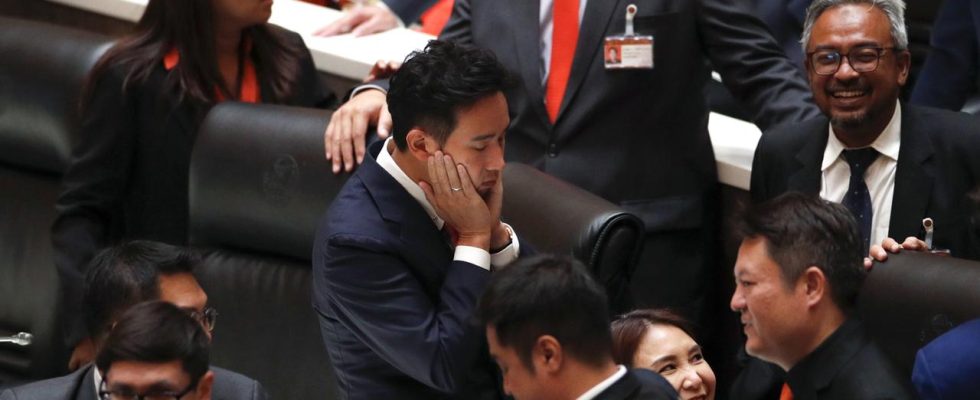Thailand’s progressive election winner Pita was not elected the new prime minister in a parliamentary vote. The result could trigger larger demonstrations.
Pita Limjaroenrat was the winner of Thailand’s general election in May. Now, in the first round of the parliamentary vote, he did not get the majority required for election as prime minister. He was 51 votes short of winning the election.
Out of 749 deputies, Pita received only 324 votes. 182 voted against the progressive 42-year-old, 199 abstained or were absent. Pita was the only candidate. His coalition has a majority of 312 seats in the lower house. However, in addition to the 500 newly elected members of the House of Commons, the new Prime Minister will also be decided by 249 senators who were appointed by the military after a coup in 2014 and have remained largely loyal to it to this day. Only 13 senators voted for Pita.
Protests that could become more massive
Pita is expected to stand for re-election next Wednesday. He announced a new strategy to get the votes needed at the next ballot. From the start, observers assessed Pita’s chances of forming a government with the eight-party alliance led by his party Move Forward as slim. The coalition could therefore also decide to nominate another candidate for election next week. For example, the real estate tycoon Srettha Thavasin, the top candidate of the second largest opposition party, Pheu Thai.
The prime minister’s election could drag on for weeks or even months if the Senate continues to block the election of Pita or any other opposition candidate.
Democracy activists say the Senate ignores the will of the people. Supporters of the election winner, Pita, watched the vote on large screens in front of Parliament. Many wore orange, the color of the Move Forward party. Already last night hundreds protested in front of the parliament in Bangkok. Now it is feared that there could be much more massive protests on Bangkok’s streets.
Do legal allegations lead to a ban on politics?
But Pita also faces other challenges. Thailand’s Electoral Commission announced yesterday that it has accused Pita of violating electoral laws and has referred the case to the Constitutional Court. This could now order Pita to be released from his MP duties until a verdict is passed. Pita is accused of owning shares in a defunct media company at the time of the election. This is forbidden in Thailand.
The Bangkok Post quoted Pita as saying: “The media company in question has been closed for ages and I only held the shares as an executor of my father’s estate.” In a second case, Harvard graduate Pita is accused of planning the overthrow of the monarchy – justified by Pita’s announcements to change the lese-majeste law.
Pita has repeatedly stated that he does not want to abolish the monarchy, but only to reform it in order to improve relations between the military and the population. If found guilty, he faces several years in prison and a ban on politics.
Hoping for the end of the conservatives power structures
Similar legal allegations led to Move Forward’s predecessor party – Future Forward – being sidelined after the 2019 general election. At that time, the constitutional court disqualified the promising candidate Thanathorn Juangroongruangkit, who surprisingly came third in the elections, and then ordered the party to be dissolved. The decision drove tens of thousands of young demonstrators onto the streets.
Many people are hoping for an end to the previous conservative power structures. Since a coup in 2014, Thailand has been ruled by former General Prayut Chan-o-cha. The 69-year-old announced his retirement from politics on Tuesday. Until the new head of government is elected, he will remain in office on an interim basis.

